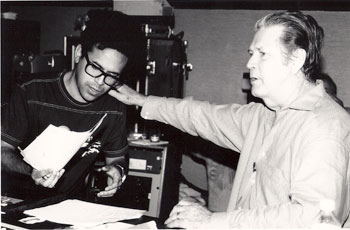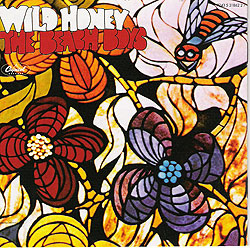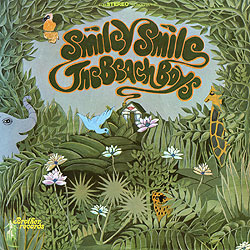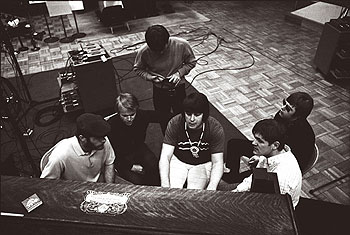The SMiLE Meme
Published on November 29th, 2011 in: Music, Over the Gadfly's Nest |By Paul Casey

Smile logo
by Mark London
“SMiLE music is sacred. It is not to be messed with. Isn’t anything sacred anymore?”
—Sheriff John Stone
The Smile Sessions, released on November 1 from EMI and Capitol Records, marks in a significant way, the end for those who have centered their lives around the SMiLE Meme. The myth of the Perfect Album. The myth of the Lost Album. The myth of The Beach Boys (and their insecure fans) besting The Beatles (and their satisfied fans). While the reality of the music of SMiLE and the journey it went on is far more interesting to this writer’s ears, some continue to covet the picture in their head with fetishistic pride.
In 2003 Brian Wilson announced that he would be completing the SMiLE album in order to perform it live in a series of shows set for the following year. The reaction from long time members of the SMiLE faithful was not wholly united, but was largely one of elation. As a member of a close knit, intelligent, and occasionally deranged message board community of SMiLE obsessives, I experienced much of the celebration.
It meant a lot to me in early 2004 when I went to see Brian Wilson perform SMiLE live in the Clyde Auditorium in Glasgow. There was, however, something else in among the celebrations, the informed histories of recording sessions, and imaginative theories about what structure the show and eventual album would take: dour, sullen people who harp on about What Would Have Happened, while ignoring What Did Actually Happen.
There is no music more joyous or hopeful than The Beach Boys. From Surfin’ Safari on, there is barely a harsh word to be sung, let alone anything approaching the kind of tiresome cynicism one would expect from a semi-homeless beat poet. Yet this is what one will find in large quantities today, and if I am being honest with myself, what one did find back in the early years of the 2000s. Thankfully John Lane and Jon Hunt’s wonderful Smile Shop, which I called home, was mostly free from such dull negativity.
When I speak of dull negativity, I refer to the barrage of self-pitying words—alternating between delusion and fantasy—one encounters when discussing anything surrounding SMiLE .

Darian Sahanaja and Brian Wilson
If you want to engage with some peripheral webzine blowhard on why The Beatles’ fans are idiots because they don’t understand Brian Wilson’s all-conquering genius, SMiLE’s got you covered! If you want to weep with the frustrated Adult Children who never got over the fact that The Beach Boys missed their chance to be considered Hip, SMiLE’s got you covered! If you want to dabble with elitists who praise SMiLE’s unusual and experimental edge, then shift gears into obscene, credulous populism for Smiley Smile, SMiLE’s got you covered! What is it that drives Beach Boys fandom to this kind of self-pitying, obtuse, and embarrassing behavior? Why is SMiLE at the center?
To start with, SMiLE represents the need for many fans of The Beach Boys to be vindicated in a public forum. The idea that Brian Wilson could have been (seen as) an equal of John Lennon or Bob Dylan—by the mainstream—in 1967 is one which, even today, is raised by people who should really know better. “Will The Smile Sessions make The Beach Boys Hip to Today’s Audience??”
Although one can see the appeal of the underdog story, and the blatant wish fulfillment of so many awkward, shy people that the “Brian Wilson Is Greater Than John Lennon” part of the SMiLE meme represents, it is still one from childhood. Some it seems, never got over the school yard game of “my musical cock is bigger than your musical cock.”
If SMiLE represented the only high-point of The Beach Boys’ career, then one could perhaps start to see why so much importance was placed on it’s impact upon the mainstream. Yet The Beach Boys were not only responsible for several classic albums prior to 1967, but many after it, too. Surfer Girl, All Summer Long, Today!, and of course Pet Sounds all came before SMiLE. If Pet Sounds doesn’t make people think Brian Wilson and The Beach Boys are Hip, then hell, maybe they’re just not Hip.
Secondly, SMiLE is used to mark the point of decline in the career of Brian Wilson and the group. This argument is tied to the perceived quality of their work post 1967, although it’s still wrapped up with its mainstream reception. Whereas the desire for one’s tastes to receive widespread adoration is an understandable, if basically infantile need, using SMiLE as the death of quality requires the listener to occupy a self-contradictory position. This is not merely about one’s preferences—you often find these fellows admitting on one hand that they love Wild Honey while stating that nothing was as good after SMiLE—but about attempting to construct an alternate timeline.
This alternate timeline needs to conjure up albums that are superior in every way to those released from 1967 on. There are few (if any) hardcore SMiLE fans who legitimately contend that the failure of SMiLE was the end of the Beach Boys operating at a highly creative level. Wild Honey, Friends, Sunflower, Surf’s Up, and Holland all still happened, and would have likely not happened had the 12-track SMiLE turned up on schedule. We should be inured, I suppose, to thinking that reality is ever preferable to a SMiLE obsessive. Although they proclaim a deep love for these albums, even extending to the mentally-deranged-but-lovable Love You, they are sure that whatever would have happened after SMiLE would have been better. The most specific benefit offered was a “better produced” Wild Honey.

So if it is freely admitted that SMiLE was in no way the end of quality music from the group, and indeed from Brian Wilson, what is the substance behind this claim? It is one not of quality, but of credibility. “Yes, I loved these albums, but the public didn’t, and that is what matters.”
The story of SMiLE, is in its most basic terms that of an artist who lost confidence in himself, one who needed support from someone, somewhere to reach that point. The Meme of SMiLE has marked out the thousands of bootlegging listeners as those who will support such experimentation. Hip to it. Hip to the whole scene. (Though we fuckin’ hate Hipsters? Ya feel me?)
Yet it seems this support does not extend to the making of music which may not coincide with the broadest audience possible, even in retrospect! This self-contradictory position of being at once awestruck by the experimental daring of Brian Wilson, yet still being overcome by depression because of his failure at absolute mainstream success is endemic of the Beach Boys’ fanbase. Most prominent in the failing of this artistic solidarity is the frequent and dismal trashing of Smiley Smile. The common obsessive asserts that SMiLE was the end of the dream, except for those six or seven other albums that are fucking awesome, and that he will follow this artist anywhere, unless he mixes something a bit strangely with an organ on top.
SMiLE, from this viewpoint, requires a brain made for doublethink, the album equivalent of Schrodinger’s Cat. The album needs to have failed, but only in ways that preserve its perfection. It requires that Smiley Smile exist, and is used to mirror the qualities of that bigger better, work.
Condescending conversations start with, “Have you heard the real version of ‘Wind Chimes’?” Acknowledging Smiley Smile’s existence comes dangerously close to undermining the central thesis here, which is that SMiLE could never have been less than its potential. A listen to The Smile Sessions brings many things into a sharper clarity than ever before. One of the most intriguing is the number of possible forms of these songs which were considered by the artists, which are significantly inferior to the songs as released.
The most obvious case of this is the second version of “Wonderful,” which features Carl Wilson on an incomplete lead vocal, with an horrendous, hammy, overstuffed backing vocal. “Oh pretty baby won’t you Rock With Me Henry?” Too many ideas. That anyone could make the argument that “Rock With Me Henry” is preferable to the beautiful, densely packed mono mix of “Wonderful” from Smiley Smile, is beyond reasonable minds. Yet it happens.
Why? Simple: The SMiLE Meme, which speaks of the ever-shifting perfection tailor-made for every single person which could never ever disappoint is more powerful than the idea that “Rock With Me Henry” is a shitty cast off from an artist with too many ideas. It is also more powerful than the decisions which the artists actually made.

“Heroes and Villains” was completed by the artist, another inconvenient fact for the SMiLE obscurantists. It exists in the dreaded grey area of time when Brian Wilson’s artistic choices clashed with the audience. Those who speak of the artist “cannibalizing” “Do You Like Worms?” for the chorus—insinuating that such a choice and the resulting single is somehow less legitimate as a result—avoid coming to terms with the reality of Brian Wilson’s artistic choices.
Much of the reaction to Smiley Smile, the album which the artist did complete and release, is also informed by an inability to look at What Really Happened. There is a scary world out there which presents the possibility of not liking what Brian Wilson did at his creative peak. Instead of dealing with the fallibility of the artist—or more importantly the listener—the decision is made instead to remove its legitimacy like a grubby lard-head removes candy treats. “But he didn’t mean it!”
SMiLE had several distinct forms, and a shifting set of songs. A listen to the revelatory recording of “Cool Cool Water” from July of 1967 indicates that Brian Wilson considered the break between SMiLE and Smiley Smile to be less than distinct. Work on “I Love To Say Da Da” continued to evolve right after the supposedly calamitous cancellation of his magnum opus, as it had been evolving since “All Day.”
There is certainly a conceptual shift between Smiley Smile and the hallowed ground of SMiLE, yet there were similar shifts during the recording of SMiLE, too. Brian Wilson was stripping back the layers, and trying hard to get to the point with “Heroes and Villains.” He had recorded a third version of “Wonderful” with a piano backing track very similar to how the song ended up on Smiley Smile. One could almost see an album called SMiLE that could have been very close to the sound and shape of Smiley Smile. When a SMiLE obscurantist comes close to this realization, expect to hear the ol’ chestnut: “But if it was SMiLE it would have been called SMiLE!” They get low and simple when it suits, see.
My point is not to suggest that Smiley Smile is SMiLE, rather that it could have been. Or it could have been a mess of an album, with the worst of the repetition to be found in some misguided mixes which think that the looping of the “Bicycle Rider” theme over an hour is somehow profound.
Had Brian Wilson completed a mid-1967 version of SMiLE, the 12-Track Purists and their increasingly threatened hold on the One True Way, would be honor-bound to make the same objections. The shape of a late SMiLE, called SMiLE by The Beach Boys would be illegitimate for the same reasons as Smiley Smile or Brian Wilson Presents SMiLE or 2011’s SMiLE. That it was not what it had started out as, that songs had been “cannibalized” for other songs, that the artistic process is a confusing and evolving thing.
Seeing Smiley Smile as the literal completion of the work taken on during The Smile Sessions is to acknowledge that SMiLE was not the Holy Grail. Seeing Brian Wilson Presents SMiLE as more important than the self-important bootlegger is to admit that “audience participation” is at best a confused stab at creativity from those who don’t quite have it. Seeing The Smile Sessions as the final word is to let the Meme go, and start dealing with reality.
SMiLE was not the Beach Boys’ salvation. It was an interesting set of songs that the artists considered less precious and less untouchable than their followers. It is not really the re-recording of “Vegetables,” “Wonderful,” or “Wind Chimes” that rankles, any more than it is the sparser sound. It is Smiley Smile and Brian Wilson daring to suggest that the Meme of SMiLE, and the fantasies and security it gives to the listener, are less important than an artist following his muse, and indeed getting a goddamn album out. Support for an artist going anywhere creatively that is retracted when things get weird is no support at all.

Photo © Guy Webster, courtesy of Brian and Melinda Wilson
From Sound On Sound
The Meme of SMiLE has not survived for decades on the back of the music made by Brian Wilson during 1966 and 1967. No, it has survived by allowing the listener to play the role of Defender, Artist, and Prophet. Thousands of back seat drivers who are not only clueless as to the Right Way, but can’t even work the pedals. Are there no rules any more? Is nothing sacred? The true religious experience of SMiLE came after the music, when Inquisitions and accusations of impurity overtook the harmonies.
There is nothing harmonious about the Meme of SMiLE. It is one long, odious defense of something intangible, and unknowable. For a long time it was a defense from the nasty thoughts of the Salieri, Mozart killin’ bastard Mike Love. Then it was from the evil Melinda orchestrating-things-behind-the-scenes-to-reconstruct-a-SMiLE-beast-from-the-goo-of-anti-12-Track-Purist-audiophiles. Now, it is from the sonic evils of fly-ins and Smooth Edits. We must be honest with ourselves as to why we have reacted in these ways. This music needs no defense. Perhaps our fragile egos do.
For those in the mode of the Inquisition, with fogged up minds, with “Do You Like Worms?” splay-legged on the rack: stay in the dungeon. A blasphemy has been done to your cult, not to the music. The worst thing Smiley Smile ever did was dare to be real. The worst thing that Brian Wilson Presents SMiLE ever did was dare to be real. And the worst thing that The Smile Sessions will ever do, is dare to be real.
One Response to “The SMiLE Meme”
November 29th, 2011 at 10:17 am
[…] 2011, is the end of a long strange journey. You can read my thoughts on the phenomenon of SMiLE in my other article, but this one is purely about the music. The Smile Sessions comes in many forms, the two most […]
Time limit is exhausted. Please reload the CAPTCHA.